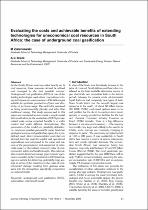 ResearchSpace
ResearchSpace
Evaluating the costs and achievable benefits of extending technologies for uneconomical coal resources in South Africa: the case of underground coal gasification
JavaScript is disabled for your browser. Some features of this site may not work without it.
- ResearchSpace
- →
- Research Publications/Outputs
- →
- Journal Articles
- →
- View Item
| dc.contributor.author |
Zieleniewski, M

|
|
| dc.contributor.author |
Brent, AC

|
|
| dc.date.accessioned | 2009-02-18T08:37:28Z | |
| dc.date.available | 2009-02-18T08:37:28Z | |
| dc.date.issued | 2008-11 | |
| dc.identifier.citation | Zieleniewski, M and Brent, AC. 2008. Evaluating the costs and achievable benefits of extending technologies for uneconomical coal resources in South Africa: the case of underground coal gasification. Journal of Energy in Southern Africa. Vol 19(4), pp 21-31. | en |
| dc.identifier.issn | 1021-447X | |
| dc.identifier.uri | http://hdl.handle.net/10204/3017 | |
| dc.description | Copyright: 2008 Energy Research Institute | en |
| dc.description.abstract | As the South African economy relies heavily on its coal resources, these resources should be utilised and managed in the best possible manner. Underground coal gasification (UCG) is one of the leading technologies used where conventional mining techniques are uneconomical. UCG delivers gas suitable for synthesis, production of fuels and electricity, or for home usage. The method is perceived as being environmentally friendly and safer than traditional mining. The study summarised in this paper was conducted so as to create a simple model that would allow for the evaluation of UCG processrelated costs versus expected benefits in a wider context and under different circumstances. The parameters of the model are: feasibility definition, i.e. maximum possible gas calorific value, based on geological surveys and gasification agents for a predefined need; direct process-related costs that are derived from the expected capital and operational expenditures and compared to the value and volume of the gas produced; and assessment of externality costs, i.e. the indirect economic value of environmental, safety and health benefits. The externalities concept should encourage governmental agencies to consider further investment in UCG technology as a vehicle for delivering, potentially, high savings in terms of the reduction in the costs of environmental damage resulting from gaseous emissions into the atmosphere, specifically expenditure on national health. | en |
| dc.language.iso | en | en |
| dc.publisher | Energy Research Institute | en |
| dc.subject | Underground coal gasification | en |
| dc.subject | Cost benefit analysis | en |
| dc.title | Evaluating the costs and achievable benefits of extending technologies for uneconomical coal resources in South Africa: the case of underground coal gasification | en |
| dc.type | Article | en |
| dc.identifier.apacitation | Zieleniewski, M., & Brent, A. (2008). Evaluating the costs and achievable benefits of extending technologies for uneconomical coal resources in South Africa: the case of underground coal gasification. http://hdl.handle.net/10204/3017 | en_ZA |
| dc.identifier.chicagocitation | Zieleniewski, M, and AC Brent "Evaluating the costs and achievable benefits of extending technologies for uneconomical coal resources in South Africa: the case of underground coal gasification." (2008) http://hdl.handle.net/10204/3017 | en_ZA |
| dc.identifier.vancouvercitation | Zieleniewski M, Brent A. Evaluating the costs and achievable benefits of extending technologies for uneconomical coal resources in South Africa: the case of underground coal gasification. 2008; http://hdl.handle.net/10204/3017. | en_ZA |
| dc.identifier.ris | TY - Article AU - Zieleniewski, M AU - Brent, AC AB - As the South African economy relies heavily on its coal resources, these resources should be utilised and managed in the best possible manner. Underground coal gasification (UCG) is one of the leading technologies used where conventional mining techniques are uneconomical. UCG delivers gas suitable for synthesis, production of fuels and electricity, or for home usage. The method is perceived as being environmentally friendly and safer than traditional mining. The study summarised in this paper was conducted so as to create a simple model that would allow for the evaluation of UCG processrelated costs versus expected benefits in a wider context and under different circumstances. The parameters of the model are: feasibility definition, i.e. maximum possible gas calorific value, based on geological surveys and gasification agents for a predefined need; direct process-related costs that are derived from the expected capital and operational expenditures and compared to the value and volume of the gas produced; and assessment of externality costs, i.e. the indirect economic value of environmental, safety and health benefits. The externalities concept should encourage governmental agencies to consider further investment in UCG technology as a vehicle for delivering, potentially, high savings in terms of the reduction in the costs of environmental damage resulting from gaseous emissions into the atmosphere, specifically expenditure on national health. DA - 2008-11 DB - ResearchSpace DP - CSIR KW - Underground coal gasification KW - Cost benefit analysis LK - https://researchspace.csir.co.za PY - 2008 SM - 1021-447X T1 - Evaluating the costs and achievable benefits of extending technologies for uneconomical coal resources in South Africa: the case of underground coal gasification TI - Evaluating the costs and achievable benefits of extending technologies for uneconomical coal resources in South Africa: the case of underground coal gasification UR - http://hdl.handle.net/10204/3017 ER - | en_ZA |





